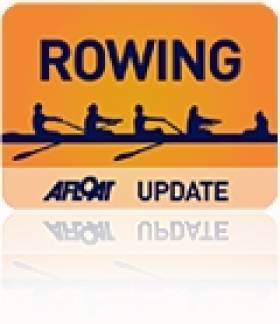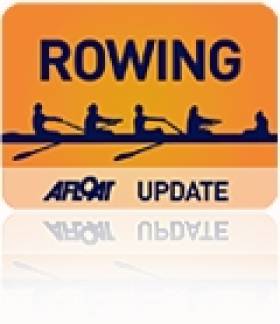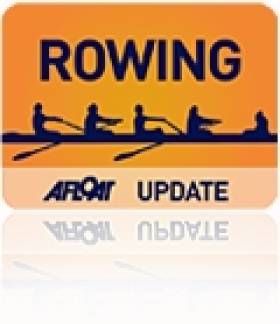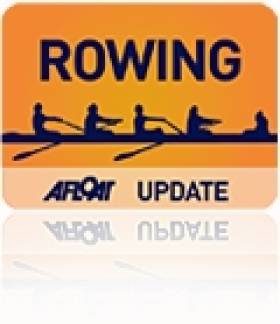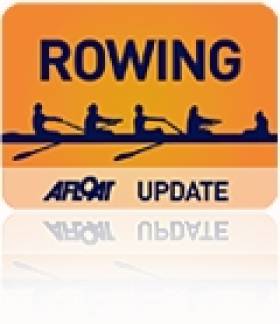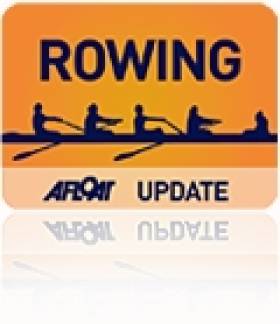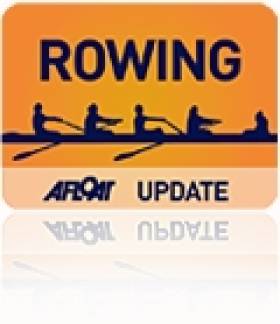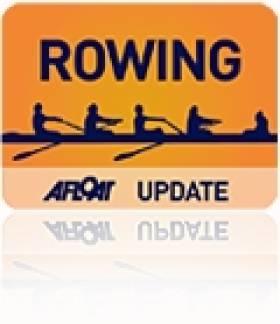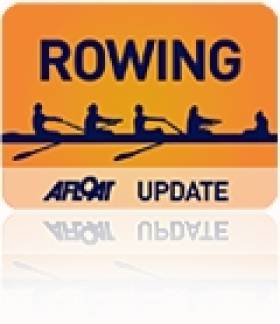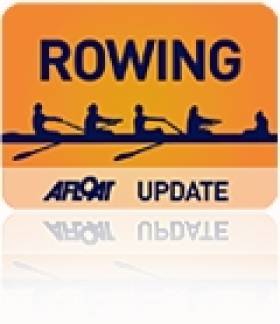Displaying items by tag: National Rowing Centre
Emma Desmond Takes Second Behind Jennings at Ireland Trial
#ROWING: Emma Desmond impressed at the Ireland trial at the National Rowing Centre today. The 28-year-old Corkwoman, who took up the sport in late 2012, finished second to Sinéad Jennings in the time trial for lightweight single scullers and took her place in the matrix for lightweight doubles with Jennings and Denise Walsh and Siobhán McCrohan, who finished third and fourth. Claire Lambe did not trial because of injury. The matrix later had to be abandoned when McCrohan pulled out injured.
Justin Ryan - a lightweight - was the fastest men's single sculler, with Dave Neale heading up the heavyweight ranks. Max Rowan, who is originally from Australia but now competes for Skibbereen, was second to Neale. Sanita Puspure, who has a rib injury could not compete in the women's single, with the pair of Lisa Dilleen and Leonora Kennedy and single sculler Monika Dukarska the fastest women. Paul O'Donovan and Gary O'Donovan trialled with this group as a lightweight double and set a good time.
Ireland Trial, Saturday, December 20th (Selected Results)
Heats (time trial over 19000m; per centage of projected world gold medal time)
Men
Heavyweight Pair: 1 Coughlan, Deere 6:44.29 (86.5 per cent), 2 Meehan, Crowley 6:48.38 (85.6), 3 Harrington, McGuckian (under-23) 6:51.06 (85.0).
Heavyweight Single: 1 D Neale 6:58.42 (88.5), 2 M Rowan 7:03.06 (87.6), 3 T Oliver 7:05.56 (87.1), 4 T Hughes 7:06.16 (86.9), 5 M Maher 7:06.94 (86.8), 6 E Rowan 7:07.6 (86.6).
Lightweight Single: 1 J Ryan 6:55.99 (90.9), 2 A Burns (under-23) 6:59.36 (90.2), 3 F McCarthy (u-23) 7:09.01 (88.1), 4 S Toland 7:09.34 (88.1).
Singles/Crew Boats (Men/Women): 1 P O'Donovan, G O'Donovan (lightweight men's double scull) 6:16.97 (91.2), 2 L Kennedy, L Dilleen (heavyweight women's pair) 7:01.34 (91.1), 3 M Dukarska (women's single) 7:27.39 (90.2), 4 K McCarthy (women's single) 7:40.32 (87.7), 5 S O'Brien (under-23 women's single) 7:55.6 (84.9).
Women
Lightweight Single: 1 S Jennings 7:23.67 (93.8 per cent), 2 E Desmond 7:29.96 (92.5), 3 D Walsh 7:31.27 (92.2), 4 S McCrohan 7:32.07 (92.0).
O'Callaghan Honoured at National Rowing Centre
#ROWING: Rowing Ireland honoured Mick O'Callaghan at the Irish Rowing Championships at the National Rowing Centre in Cork today. Bernard Allen, the former Minister for Sport and TD for Cork North Central, unveiled a special plaque to the Lee Valley man for his "enormous contribution" to the development of the impressive Centre. The plaque is at the front left of the boathouse, close to where presentations are made to winners at the Championships.
Rowers and Coaches Get Thumbs Up from Olympic Council
#ROWING: Two of the top executives of the Olympic Council of Ireland have visited the National Rowing Centre in Cork and complimented the rowers and mentors on the professionalism of their programme.
Stephen Martin, the chief executive of the OCI, and Kevin Kilty, the chef de mission for the Ireland team at the Olympic Games in 2016, visited the National Rowing Centre on Friday. They were hosted by Morten Espersen, the Ireland high performance director, and Rowing Ireland chief executive Hamish Adams.
Martin and Kilty viewed the world-class facilities at the NRC and dropped in on a training session for the high performance rowers overseen by coaches Don and Mary McLachlan. The athletes train 14 to 16 times every week. The Olympic Council executives spoke to the athletes and answered questions about the OCI’s preparations for Rio 2016.
“I was delighted to take Morten up on his offer to see his athletes train here at the National Rowing Centre,” Kilty said. “The dedication of the athletes and coaches is inspiring and I must commend the work of Rowing Ireland and that of Morten and Hamish.”
He said he was certain rowers would feature strongly in Team Ireland’s performance in Rio 2016.
Martin added: “The work of Rowing Ireland here at the National Rowing Centre is exceptional and we at the OCI are working closely with the coaches and Morten to assist their work in delivering qualification for and ultimately success in Rio. I am extremely impressed by the dedication and commitment of the athletes that Kevin and I have met here today and we will support their endeavours to achieve qualification and success in Rio.”
Rowers Sleep at National Rowing Centre as Thieves Strike
#ROWING: Outboard motors worth up to €20,000 were stolen from the National Rowing Centre in Cork at the weekend. It is understood that rowers from the High Performance Programme were staying at the NRC when thieves took the engines, which were attached to catamarans and tinnies moored on the water. The raid did not come from the land.
Rowing Ireland has advised that anyone who becomes aware of 15HP Hondas and 20HP Yamahas being offered for sale should contact the Gardaí.
Trinity Win Senior Eights But UCD Take Wylie and BoI Trophies
#ROWING: UCD took the Wylie Cup for men and the Bank of Ireland Cup for women at the University Championships of Ireland at the National Rowing Centre in Cork today. Under the new rules two wins in eights across the grades of Novice, Intermediate, Club and Senior grades sufficed. UCD won the men’s Novice and Club eights and the Novice and Intermediate in women’s eights.
It was, however, a particularly good day for Trinity. They bested UCD in both the senior men’s and women’s eights and won the overall points classification.
University Championships of Ireland, National Rowing Centre (Selected Results)
Men
Wylie Cup: UCD
Eight – Senior: 1 Trinity, 2 NUIG, 3 UCD. Club: 1 UCD A, 2 Trinity, 3 Queen's. Intermediate: 1 NUIG, 2 Trinity, 3 UCD A. Novice: 1 UCD A, 2 Trinity A, 3 Queen’s A.
Four – Club, coxed: UCD A.
Pair – Senior: UCC.
Sculling, Quadruple – Senior: UCC. Novice: Queen’s. Double – Intermediate: Cork IT. Single – Senior: 1 Univ of Limerick (M O’Donovan). - Intermediate: UCC (S O’Connor).
Women
Bank of Ireland Cup: UCD
Eight – Senior: 1 Trinity B, 2 UCD, 3 Trinity A. Club: 1 NUIG, 2 Queen's, 3 Trinity. Intermediate: 1 UCD, 2 NUIG, 3 Trinity. Novice: 1 UCD, 2 Queen’s A, 3 Trinity B.
Four – Senior: Trinity B. Club, coxed: NUIG. Intermediate, coxed: UCC.
Sculling, Quadruple – Novice, coxed: NUIG. Double – Intermediate: Trinity B.
Single – Intermediate: Trinity (S Dolan).
Overall Points Winners: Trinity.
#IrishRowingChampionships: The first session of senior finals at the Irish Rowing Championships started with a tremendous win for the women’s four of Frances Judge, Marie O’Neill, Anna Wickham and Lisa Dilleen from NUIG/Cork Boat Club. The Skibbereen/Killorglin four headed them in the middle stages of the race but Cork/NUIG fought back into the headwind and pipped their rivals by .3 of a second.
In very warm and clear conditions at the National Rowing Centre in Cork, the titles were spread widely. Shannon’s Conor Carmody won the men’s junior single sculls, seeing off a good fight by David O’Malley of St Michael’s; Bridget Jacques and Jasmine English of Belfast Boat Club were clear winners of the junior double sculls; Gill Crowe and Sally O’Brien, who are lightweights, brought the women’s intermediate pair to Trinity with plenty to spare; UCC and Commercial had good wins in the men’s intermediate coxed four and the women’s novice coxed four respectively.
Amongst the most impressive winners were Eimantas Grigalius (27) and Ryan Corcoran (35) of Three Castles. They powered well clear of Commercial and Skibbereen by the finis to win the first Irish Championship for both of them.
Irish Rowing Championships, National Rowing Centre, Farran Woods, Day One (Selected Results; Finals)
Men
Four – Intermediate, coxed: 1 UCC 7:14, 2 NUIG A 7:20, 3 Trinity A 7:22.
Sculling, Double – Senior: 1 Three Castles (R Corcoran, E Grigalius) 7:09.86, 2 Commercial 7:17.43, 3 Skibbereen 7:17.51.
Single – Junior 18: 1 Shannon (C Carmody) 8:43, 2 St Michael’s (D O’Malley) 8:48, 3 Belfast BC (G McKillan) 9:05.
Women
Four – Senior: 1 Cork/NUIG (F Judge, M O’Neill, A Wickham, L Dilleen) 7:33.22, 2 Skibbereen/Killorglin 7:33.52, 3 St Michael’s 7:25.21. Novice, coxed: 1 Commercial 8:11, 2 NUIG 8:14, 3 Queen’s 8:24.
Pair – Intermediate: 1 Trinity (G Crowe, S O’Brien) 9:22, 2 St Michael’s 9:42, 3 Commercial 9:47.
Sculling, Double – Junior: 1 Belfast BC (J English, B Jacques) 8:21, 2 Cork BC 8:32, 3 Castleconnell 8:41.
St Michael's Women's Eight Shine at Skibbereen Regatta
# ROWING: SKIBBEREEN REGATTA: St Michael’s won the big prize in the morning session of finals at Skibbereen Regatta at the National Rowing Centre. The women’s senior eight of Jessica O’Keeffe, Aoife Leahy, Emily Tormey, Alice O’Sullivan, Kate O’Brien, Ailish Sheehan, Orla McEvoy, Hannah O’Sullivan and cox Conor McGowan saw off UCD to win well in the final eFlow Grand League Regatta of the season. The crew may be further strengthened by Sinead Jennings and Sheila Clavin, whose bid to win the double sculls was derailed with surprising aplomb by Helen Walshe and Eimear Moran of Three Castles. St Michael’s also won the women’s coxed four, and the men’s pair through Kevin O’Connor and Mike O’Brien.
John Keohane was untroubled in his win in the men’s single sculls and UCC had good wins in the coxed four and the Division Two eights, where their novice crew won a battle with the UCD novice eight.
Skibbereen started the day with a win, though in an unexpected fashion: their senior women’s quadruple broke an oar, but the juniors stepped up to win the A Final.
Skibbereen Regatta, National Rowing Centre, Selected Results
(Selected Results: Division One comprises senior (open, under-23 and lightweight), intermediate and junior 18A grades; Division Two comprises novice, junior 18B and junior 16 grades.)
Men
Eight – Division Two – A Final: 1 UCC (nov) 6:12.96, 2 UCD (nov) 6:15.12, 3 Cork (jun 18B) 6:20.05;
Four, coxed – Divsion One – A Final: 1 UCC (inter) 6:29.66, 2 NUIG (inter) 6:32.9, 3 Trinity (inter) 6:33.60; 4 St Michael’s (jun 18A) 6:45.78. B Final: NUIG (inter) 6:42.18.
Pair – Division One – A Final: 1 St Michael’s B (K O’Connor, M O’Brien; sen) 6:52.69, 2 St Michael’s C (sen) 6:55.62, 3 Clonmel (jun 18A) 6:55.97. B Final: St Joseph’s (jun 18A) 7:14.02; 4 Commercial (inter) 7:35.29. C Final: Blackrock College (jun 18A) 7:39.55.
Sculling,
Single – Division One – A Final: 1 Lee Valley (J Keohane, sen) 7:12.18, 2 Three Castles (Grigalius, sen) 7:20.89, 3 Skibbereen (Ryan, jun 18A) 7:21.59; 4 Skibbereen (Burns, u23) 7:22.59; 6 Clonmel (Prendergast, inter) 7:23.44. B Final: Portadown (McKeown, inter) 7:31.83. C Final: 1 Three Castles (Corcoran, inter) 7:42.87; 2 Clonmel (Channon, lwt) 7:45.65. D Final: Skibbereen (Barry, inter) 7:57.57. Division Two – A Final: 1 Castleconnell (E Whittle, jun 16) 7:38.19, 2 Lee (White, jun 18B) 7:40.50, 3 Shandon (Begley, jun 18B) 7:43.82; 5 Univ of Limerick (Koyayashi; nov) 7:39.35. B Final: Waterford (Goff, jun 16) 7:41.25. C Final: Skibbereen (McCarthy, nov) 7:53.80. D Final: UCD (Toland, nov) 8:05.52.
Women
Eights – Division One – A Final: 1 St Michael’s (sen) 6:32.25, 2 UCD (sen) 6:34.32, 3 Skibbereen (sen) 6:38.68. B Final: 1 Cork (jun 18B) 6:51.83, 2 Commercial (inter) 6:52.26
Four, coxed – Division One – A Final: 1 St Michael’s (sen) 7:16.4, 2 UCC (inter) 7:26.04, 3 UCD (inter) 7:37.30.
Four, coxed – Division Two – A Final: 1 Shannon (nov) 7:39.91, 2 Trinity (nov) 7:46.61, 3 Commercial (nov) 7:48.44; 4 Shandon (jun 16) 8:22.77.
Sculling
Quadruple – Division One – A Final: 1 Skibbereen (Jun 18A) 7:01.73, 2 Skibbereen (sen) 7:05.47, 3 St Michael’s (jun 18A) 7:20.57. Division Two (coxed) – A Final: 1 Skibbereen (nov) 7:39.92, 2 Killorglin (jun 16) 7:53.61, 3 St Michael’s (jun 16) 8:07.04.
Double – Division One – A Final: 1 Three Castles (H Walshe, E Moran, sen) 7:13.57, 2 St Michaels (sen) 7:27.81, 3 NUIG (inter) 7:38.38; 4 Castleconnell (jun 18A) 8:02.90. Division Two – A Final: 1 Carlow (jun 18B) 8:04.89, 2 Lee (jun 18B) 8:13.12, 3 Lee (jun 16) 8:17.70. B Final: Graiguenamanagh (jun 18B) 8:29.09. C Final: Tralee (jun 18B) 8:47.99.
# ROWING: The Irish Schools Championships were a happy hunting ground for Colaiste Iognaid of Galway. They won the overall title at the National Rowing Centre in Cork today. The junior 18 eights was won by another Galway school, St Joseph’s, but the open fours went to Ard Scoil Ris of Limerick and the open pairs was won by twin brothers Brian Keohane and David Keohane for Presentation Brothers, Cork.
The junior 14 quadruple sculls had an extraordinarily close finish, with Intermediate School, Killorglin shading it over Colaiste Iognaid, St Coleman's of Fermoy and Presentation, Cork.
O'Donovan Impressive at Irish Rowing Trials
# ROWING: John Keohane was the fastest man at the Ireland Trials at National Rowing Centre in Cork today. However, the Lee Valley heavyweight was just nine hundredths of a second ahead of lightweight sculler Paul O’Donovan in the Time Trial. The 19-year-old from Skibbereen was assessed to have a percentage of world’s best time in his grade of 94.8 per cent – albeit with a strong tail wind. The conditions were forecast to deteriorate as the day went on and on-the-water work was done early in the morning.
Time Trial (Selected Results)
Men - Senior/Under-23/Lightweight single sculls and pairs (1900 metres; ranked on per centage of projected world best time for each class). Selected Results.
1 P O’Donovan (lightweight) 6 mins 40.85 (94.8 per cent), 2 G O’Donovan (lwt) 6:50.10 (92.7), 3 J Keohane (heavyweight) 6:40.76 (92.4), S O’Driscoll (lwt) 6:52.87 (92.0), 5 F McQuillan-Tolan/S O’Connor (heavyweight pair) 6:25.33 (91.2), 6 D Neale (hwt) 6:46.49 (91.1), 7 L Prendergast (lwt) 7:04.10 (89.6), 8 J Mitchell/M Wray (hwt pair) 6:35.16 (89.0), 9 A Burns (lwt) 7:07.79 (88.8), 10 A Boreham (hwt) 7:04.84 (87.2).
Skibbereen and Universities' Regatta Fall Foul of Weather
# ROWING: Skibbereen Regatta and the Irish Universities’ and Schools’ Championships, scheduled for Sunday and Saturday respectively, have been postponed. Faced with the forecast of high winds and rain at the National Rowing Centre, the organisers of both events opted to seek a new date. The Domestic Events Committee of Rowing Ireland will make any decision on a new position in the calendar for the regattas.
Skibbereen Regatta was set to open the eFlow Grand League series. The event had a huge entry and was to run from 7.15 am to 6.15 pm.


























